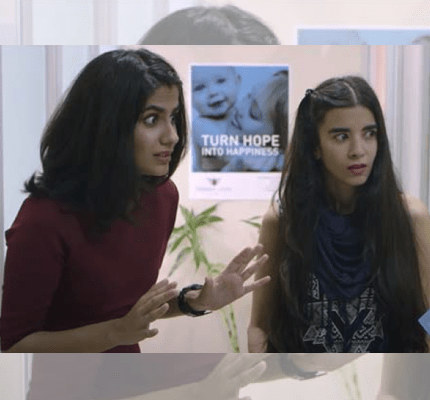
Feminism in Ladies Room, An Indian Web Series
Ladies Room is an Indian YouTube comedy series about Dingo and Khanna, two millennial women in globalized India, and their conversations in public and semi-public restrooms. The series has been enormously popular with its six episodes having drawn more than 50 million views. In a new article published in Communication and Critical/Cultural Studies, Pragya Ghosh, Radhika Parameswaran, and Pallavi Rao use textual analysis to examine scenes from Ladies Room. They argue that the show transgresses Indian cultural norms of upper-caste feminine respectability through language (such as the use of curse words), depictions of abortion, and representations of women’s struggles in the workplace.
Ladies Room
Ladies Room is designed to appeal to India’s large urban middle-class millennial population. The writers of the series, Neha Kaul Mehra and Ratnabali Bhattacharjee, draw on their own experiences as urban professional women who have confronted sexism in the private and public spheres. By featuring the show on the online platform YouTube, the show’s producers bypass the traditional limitations on Indian women’s content in legacy entertainment media. The main characters, Dingo and Khanna, are represented as members of the “English-speaking managerial-professional class.” Ghosh, Parameswaran, and Rao argue that the characters embody the “unruly woman” of comedy by “break[ing] social rules, readily giv[ing] offense, claim[ing] sexual pleasure, and violat[ing] proper bodily feminine containment.” The authors also note that the characters’ predicaments as single, professional women who navigate work and personal lives in one of India’s megacities are similar to the travails of Abbi and Ilana in Broad City, an American show about millennial women in New York City that also started as a web series.
Striking Against Feminine Respectability in Ladies Room
According to Ghosh, Parameswaran, and Rao, respectable upper-caste women in India “are expected to perform modesty through their clothing and comportment. They are polite, domesticated, chaste, educated, and professionally successful, but also family-oriented, never more ambitious than [their spouses], and dutiful wives and mothers.” Dingo and Khanna eschew traditional “feminine respectability” by being seen in restrooms, which are a taboo space. By staging the show within restrooms, the show’s writers both challenge norms about women’s bodily functions and mark the restroom as a space where upper-caste women can subvert norms of respectability.
In one scene, Dingo and Khanna smoke cannabis in a train toilet while Khanna complains about working for an abusive male boss. This scene depicts both illegal drug use and young, upwardly mobile Indian women engaging in activities, such as drinking and drug use, that historically have been associated with “loose,” Westernized women. Ghosh, Parameswaran, and Rao note that Dingo’s and Khanna’s clothing typically includes shorts, crop tops, and other Western attire, which deviate from conservative Indian norms of modesty and feminine respectability. Furthermore, the show’s cinematography avoids the “male gaze,” or the tendency to sexualize women by lingering on particular body parts or depicting women in seductive poses.
Ghosh, Parameswaran, and Rao argue that Ladies Room “transgress[es] feminine respectability” with its use of foul language and open discussions about abortion and extramarital pregnancy. Dingo and Khanna use a variety of curse words in both English and Hindi, including creating the new term “bosstards” to refer to “bastard bosses.” Such language subverts gender norms.
When discussing Khanna’s unexpected pregnancy, the Ladies Room characters invert stereotypes related to pregnancy. Khanna chooses not to share information about the pregnancy with the father, and, instead, makes the decision to terminate the pregnancy independently. Ghosh, Parameswaran, and Rao observe that the series makes clear that “Khanna declares that she would not involve her male lover Kunal in her decision to abort the pregnancy because he would be weak and sentimental.” They argue that the show’s treatment of these issues “normalize[s] premarital sex and pregnancy and affirm[s] women’s control over their bodies.”
Career-Women in Ladies Room
Dingo and Khanna both work in the white-collar communications industry; Dingo is a freelance social media manager and Khanna works for a marketing firm. Ladies Room portrays the characters’ desire to excel in their careers as well as the challenges that they face along the way. Khanna’s unnamed male boss represents India’s sexist corporate culture. The boss makes unreasonable demands and grills Khanna over small issues, such as a misplaced comma; these behaviors are meant to showcase the prevalence of workplace bullying against women workers in India, which Khanna tries to push back against.
Ladies Room also highlights the struggles that millennial workers face because of their near-constant availability via digital technologies. Khanna’s boss frequently makes demands of Khanna outside of work hours, while also “throw[ing] insults at Khanna, charg[ing] her as incompetent and lazy, and demand[ing] instantaneous, ‘drop-everything now’ assistance and immediate results.” Because these experiences are shown from Khanna’s perspective, Ghosh, Parameswaran, and Rao argue that the show challenges sexist norms and also highlights how women’s friendships can offer solace when dealing with these issues.
While Khanna’s narrative interrogates office culture, Dingo navigates the attention economy and “hope labor” by doing work for digital exposure in the hopes that it will eventually lead to a job. After being forced to relocate into Khanna’s sister Raveena’s apartment, Dingo begins a Twitter account, “@Bitchydidi” (bitchysister) that chronicles the banter between Raveena and Khanna. At first, Dingo ghostwrites blogs for Raveena in place of rent. Later, Dingo fails to secure a high-profile social media job, but the Twitter account eventually leads to more opportunities because of a viral tweet. The authors argue that this narrative points to Dingo’s “resilience under trying circumstances.”
Conclusion
Ladies Room weaves together comedy and drama to address pressing issues that young Indian women face today, including unplanned pregnancy and workplace sexism. Within the Indian political context, Ghosh, Parameswaran, and Rao argue that Dingo and Khanna “disrupt the agendas of Hindu nationalism, which polices women’s bodies and subjectivities to uphold caste supremacy and cultural chauvinism.” However, the authors note, the show’s focus on two upper-caste women simultaneously obscures the experiences of working-class and non-English speaking women in India.




